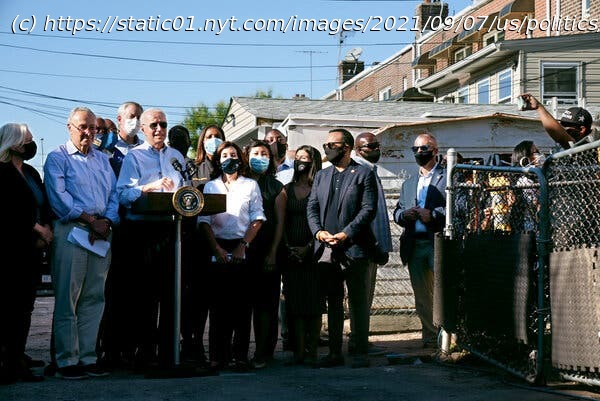“The nation and the world are in peril,” President Biden said after touring storm damage in New York and Jersey. “And that’s not hyperbole. That is a fact.”
The following is a transcript of President Biden’s remarks about climate change and Hurricane Ida after he toured damage from the storm in neighborhoods in New York and New Jersey on Tuesday. Chuck, thank you very much. As the old joke goes, my father were here, he’d say thank you, and my mother were here, she would say, “Who are you talking about?” Look, folks, let me begin by saying I wish every American could walk down this alley with me to see and talk to the people who have been devastated, just talk to them. None of them were shouting or complaining. Every one of them were thanking me as if it was something special — I mean it sincerely — that I was here and hoped that we’d be able to do something. This is America, where I am standing right now. These are the people, whether it’s Scranton or Claremont or anywhere around the world — the country, who built this country. And it’s about time we step up. They’re always the first ones that are hurt and the last ones that are helped. But that’s not going to happen this time. The group I have standing with me led by Chuck Schumer and your — Congresswoman, is this your district? Oh, it’s Grace’s district. I want to thank her personally for her gumption, the way she’s fought and hollered and fought so hard for all the people in this alley. I really mean it. Thank you, thank you, thank you. But that goes for everybody here. And look, folks. You know, I want to thank governor for — and Leader Schumer and Kirsten — I should say Senator Gillibrand — and Congresswoman [Grace] Meng and [Representative Carolyn B.] Maloney and [Representative Gregory W.] Meeks, Mayor [Bill] de Blasio for being here. You know, it’s not — how can I say this? Sometimes some very bad things happen that have a tendency to bring out the best in a people and a country. And I think what people are seeing across this country, from the wildfires in California and the Far West, which I’m heading to in a couple days, all the way to, down in Louisiana in the Gulf, where I was a couple days ago, to New Jersey and Pennsylvania, to a lesser extent, Delaware, to a lesser extent, and New York. People are beginning to realize this is much, much bigger than anyone was willing to believe. And the whole segment of our population denying this thing called climate change. But I really mean it. Sometimes my mother used to say out of everything bad, something good will come if you look hard enough for it. Well, I think we’ve all seen, even the climate skeptics are seeing that this really does matter. And it’s not just whether or not people who are just trying to get by in these homes, in these alleys here, working their butts off, do well. It’s people in high towers along the shore who find that as this rain and all this change takes place in the groundwater, the buildings are actually beginning to tilt. Hundred-story buildings — this goes so far beyond what anybody’s willing to speak to up to now. We just finished surveying some of the damage in the neighborhood, here in Queens. And earlier today, we were in the Raritan Valley in New Jersey, which also got badly, badly hit. Walking these neighborhoods, meeting the families and the first responders, seeing how folks are doing after this destruction and pain and another devastating storm, is an eye-opener. The people who stand on the other side of the fences who don’t live there, who are yelling that we are talking about and interfering with free enterprise by doing something about climate change — they don’t live there. They don’t live, they don’t understand. And you know, last week, right here, in so many other communities, these waves crashed through the streets here, testing the aging infrastructure and taking lives. More lives were taken here than down in Louisiana. Let me say that again.






